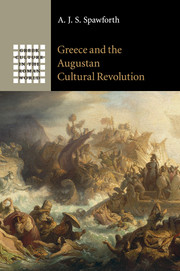Book contents
- Frontmatter
- Contents
- Illustrations
- Acknowledgments
- Chapter 1 Introduction
- Chapter 2 ‘Athenian eloquence and Spartan arms’
- Chapter 3 ‘The noblest actions of the Greeks’
- Chapter 4 ‘The gifts of the gods’
- Chapter 5 ‘Constructed beauty’
- Chapter 6 Hadrian and the legacy of Augustus
- Conclusion
- Bibliography
- Index
- References
Chapter 1 - Introduction
Greece and the Augustan age
Published online by Cambridge University Press: 05 November 2011
- Frontmatter
- Contents
- Illustrations
- Acknowledgments
- Chapter 1 Introduction
- Chapter 2 ‘Athenian eloquence and Spartan arms’
- Chapter 3 ‘The noblest actions of the Greeks’
- Chapter 4 ‘The gifts of the gods’
- Chapter 5 ‘Constructed beauty’
- Chapter 6 Hadrian and the legacy of Augustus
- Conclusion
- Bibliography
- Index
- References
Summary
This is a book about the relationship between Roman moral discourse and the cultural comportment of provincial Greeks. It argues that, during the transition at Rome from republic to monarchy (late first century bc and early first century ad), a deep-seated and, under Augustus, quasi-official concern to shore up Roman mores was communicated to the Greeks. This had the effect of reshaping local cultural profiles, most markedly in the cities and sanctuaries of Greece itself, which are the focus of this book. At the provincial end, crucial agency in this process was provided by the local notables. This elite stratum openly collaborated with Roman power in the east. Its members played a cornerstone role in the political society of the early imperial era, signalled by their possession of the civitas in increasing numbers from the triumviral age on. Their mounting exposure to cultural ‘Roman-ness’ gave rise to new forms of identity which make the blanket term ‘Greek’ too reductive as a cultural denominator, despite Greek remaining their first language. The view taken here of Greek ethnicity is avowedly non-essentialist: ‘things have no essence, no “core”’.
A decisive role in what was, in effect, a process of Greek acculturation to Roman values is attributed here to two Roman emperors: firstly Augustus, founder of the Roman imperial system, whose rule – it is argued – constructed an ‘official’ Roman narrative of Hellenism based on an ideological favouring of ‘old’ Greece and the traditions of Athens and Sparta; and, secondly, Hadrian, who powerfully reinforced this narrative in the course of his cultural politics on an unprecedented scale in the Greek east.
- Type
- Chapter
- Information
- Greece and the Augustan Cultural Revolution , pp. 1 - 58Publisher: Cambridge University PressPrint publication year: 2011

